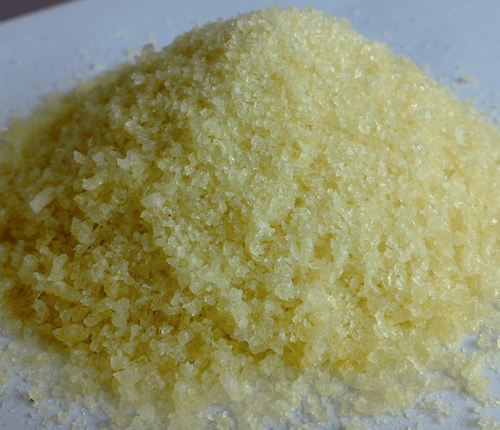Many people use gelatin as a cooking ingredient without fully understanding its remarkable health benefits. Gelatin provides an essential source of protein, offering significant value to overall health.
1. What is Gelatin?
Gelatin is a protein derived from collagen through a cooking process. Collagen is a structural protein found in animals, present in almost every part of the body but predominantly in the skin, bones, tendons and ligaments.
While collagen itself has many health benefits, it is typically difficult to consume directly because it exists in parts of animals that are not easily edible. Therefore, collagen is extracted by boiling these parts in water, producing a substance known as gelatin.
2. How Does Gelatin Benefit Health?
Although gelatin is an incomplete protein—lacking all essential amino acids—it still contains important amino acids such as glycine, proline, and valine.
Additionally, gelatin provides small amounts of vitamins and minerals, including calcium, phosphorus, and folate. These essential components contribute to various health benefits, including:
- Improved bone and joint health: Several studies have investigated gelatin's effectiveness in treating joint-related conditions such as arthritis and osteoarthritis. It significantly reduces symptoms of pain and stiffness associated with joint diseases.

- Enhanced brain function: Gelatin contains high levels of glycine, which plays a crucial role in improving memory and concentration. Furthermore, glycine has been studied in individuals with schizophrenia, showing promising results in reducing certain symptoms of the disorder. It also helps alleviate symptoms of obsessive-compulsive disorder (OCD).
- Weight management: Since gelatin is fat-free and low in calories, it aids in maintaining a healthy weight. A protein-rich diet helps reduce appetite and promotes a feeling of fullness for extended periods.
- Healthier skin and hair: Gelatin positively impacts skin hydration, increases collagen density and significantly reduces hair loss while promoting hair growth and thickness.
- Better sleep quality: Glycine in gelatin has been scientifically proven to enhance sleep quality. It reduces daytime sleepiness, making it easier to fall asleep at night and feel less fatigued the next day.
- Prevention and management of type 2 diabetes: Gelatin supports weight control and helps regulate blood sugar levels. Studies indicate that glycine consumption can lower HbA1C levels after three months.
- Gastrointestinal protection: Gelatin has been shown to protect the intestinal lining from damage, reducing common digestive issues such as irritable bowel syndrome (IBS).
- Liver protection: Gelatin supports liver function and minimizes liver damage caused by harmful factors.
- Cancer growth inhibition: A diet rich in glycine may slow cancer progression, prolong lifespan and even reduce tumor size, though further research is needed to confirm these findings.
While gelatin offers numerous health benefits, some individuals may experience allergic reactions. Additionally, gelatin has a distinct animal-derived odor and may cause mild digestive discomfort such as bloating and indigestion. People with liver failure, heart failure, blood clotting disorders or kidney failure should use gelatin with caution.

3. How to Make Gelatin-Based Dishes
Gelatin can be used to prepare a variety of delicious and nutritious dishes.
3.1 How to use gelatin powder to make yogurt
Ingredients:
- 15g gelatin powder
- 2 cans of sweetened condensed milk
- 1 liter of unsweetened fresh milk
- 2 cups of unsweetened yogurt
- Essential tools: Spoon, chopsticks, yogurt containers, large glass jar
Instructions:
- Dissolve 15g of gelatin powder in warm water, ensuring the water is not too hot to prevent clumping.
- Pour two cans of condensed milk into a glass jar, add about 800ml of boiling water and stir well. Add 1 liter of fresh milk and continue stirring until the mixture reaches a lukewarm temperature. Then, add the yogurt, ensuring the temperature is not too high to preserve the active cultures. Finally, add the pre-dissolved gelatin and mix thoroughly.
- Fermentation: This step is crucial. Pour the mixture into yogurt containers, place them in a foam box, cover tightly, and wrap with a blanket for insulation. Allow the yogurt to ferment for 6–8 hours before serving.

3.2 How to make fruit jelly using gelatin powder
Ingredients:
- 10g gelatin powder
- 50g powdered sugar
- Assorted fruits of choice
- Essential tools: Spoon, jelly molds, pot, stove
Instructions:
- Dissolve gelatin in 30ml of warm water and stir well.
- Heat 200ml of water in a pot, then add the gelatin mixture and powdered sugar, stirring until fully dissolved before turning off the heat.
- Cut the fruits into small pieces and arrange them in jelly molds.
- Pour the gelatin mixture into the molds and refrigerate for several hours until firm. Enjoy a refreshing and nutritious fruit jelly dessert.
In general, gelatin can be used to create a variety of delicious dishes to enjoy.
Gelatin is a natural protein derived from animal sources through heating. It has numerous scientifically supported health benefits. However, individuals with allergies to gelatin should avoid its consumption.
Please dial HOTLINE for more information or register for an appointment HERE. Download MyVinmec app to make appointments faster and to manage your bookings easily.
SEE MORE
- 19 Best Foods for Improved Digestion
- Are Probiotics Good for Your Brain?
- 8 Evidence-Based Health Benefits of Kombucha Tea







